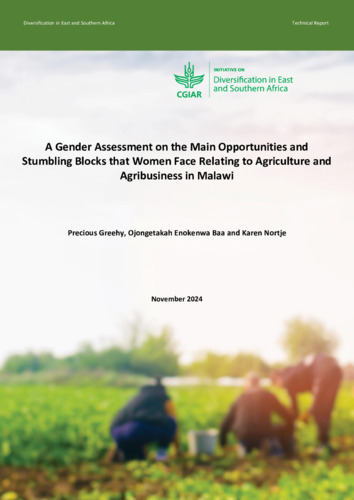A gender assessment on the main opportunities and stumbling blocks that women face relating to agriculture and agribusiness in Malawi
Abstract
Objective: This research explores the multifaceted challenges and opportunities faced by women in Malawi's agricultural and agribusiness sectors.
Context: Despite constituting a significant majority (60%) of the smallholder agriculture workforce, women in Malawi face unequal earnings, limited access to advanced agricultural technologies, and systemic gender biases within economic compensation structures. These challenges hinder their full participation and contribute to broader economic disparities within the sector.
Methodology: The study used a comprehensive approach, combining qualitative methods such as in-depth interviews, focus group discussions, and observations.
Identified Challenges: The research identified challenges, including economic disparities, limited access to resources, technological gaps, and deeply ingrained gender norms. These challenges are rooted in societal expectations, access to resources, and recognition of women's contributions. Traditional gender roles, limited training opportunities, and climate variabilities further compound the obstacles faced by women in the agricultural landscape.
Identified Opportunities: Through extensive fieldwork, the study uncovered diverse opportunities for economic growth, market exploration, skills development, and environmental sustainability. Market opportunities, soil fertility enhancement through manure, value addition, livestock integration, and mechanization emerge as potential pathways for women's empowerment. Additionally, collaborative efforts, such as group farming, networking platforms, and value addition through processing, amplify the impact of individual initiatives.
Recommendations: The research recommends targeted interventions, including subsidies, grants, and microfinance programs to address financial barriers. Gender-inclusive training programs, youth empowerment initiatives, and awareness campaigns targeting women in agriculture are crucial for challenging traditional gender roles and improving access to resources. Infrastructure development, establishment of community-based processing centers, and capacity building for collaboration are advocated to address structural challenges.
Conclusion: Empowering women in Malawi's agricultural sector necessitates a holistic approach involving policy changes, societal awareness, and collaboration among various stakeholders. The study highlights the imperative nature of recognizing and valuing women's contributions to fostering inclusive and sustainable development in Malawi's agricultural landscape. Closing the gender gap is not just a social justice concern but also a prerequisite for sustained economic growth and the overall development of the country's agricultural sector.

